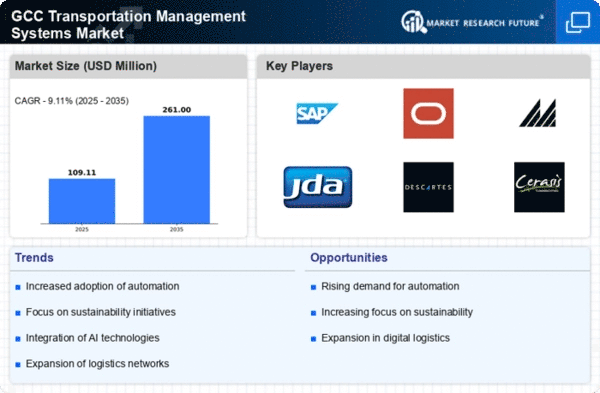Focus on Cost Reduction
Cost efficiency remains a critical driver for the Transportation Management Systems Market in the GCC. Companies are under constant pressure to minimize operational costs while maintaining service quality. Transportation management systems provide tools for optimizing routes, reducing fuel consumption, and improving load management, which can lead to substantial savings. In 2025, organizations that implement these systems may achieve cost reductions of up to 15%, enhancing their competitive edge. As businesses strive to maximize profitability, the adoption of transportation management systems becomes essential for achieving these financial objectives. This focus on cost reduction is likely to propel the market forward, as more companies recognize the value of investing in technology to streamline their logistics operations.
Rising E-commerce Demand
The surge in e-commerce activities across the GCC region is driving the Transportation Management Systems Market. As online shopping becomes increasingly popular, logistics and supply chain efficiency are paramount. Companies are investing in advanced transportation management systems to streamline operations, reduce delivery times, and enhance customer satisfaction. In 2025, the e-commerce sector in the GCC is projected to reach approximately $25 billion, necessitating robust transportation solutions. This growth compels businesses to adopt sophisticated systems that can handle increased shipment volumes and optimize routes, thereby improving overall operational efficiency. The transportation management-systems market is thus positioned to benefit significantly from this trend, as organizations seek to leverage technology to meet the demands of a rapidly evolving retail landscape.
Adoption of Data Analytics
The integration of data analytics into transportation management systems is emerging as a pivotal driver in the GCC market. Companies are increasingly recognizing the value of data-driven decision-making to enhance operational efficiency and customer service. By leveraging analytics, organizations can gain insights into transportation patterns, optimize supply chain processes, and predict demand fluctuations. In 2025, it is estimated that businesses utilizing data analytics in their transportation management systems could improve delivery accuracy by up to 20%. This capability not only enhances customer satisfaction but also contributes to cost savings and resource optimization. As the Transportation Management Systems Market evolves, the emphasis on data analytics is likely to shape the future of logistics and supply chain management in the region.
Increased Regulatory Compliance
The Transportation Management Systems Market is also influenced by the growing emphasis on regulatory compliance within the GCC. Governments are implementing stricter regulations regarding transportation safety, environmental standards, and data security. Companies are compelled to adopt transportation management systems that ensure compliance with these regulations, thereby avoiding potential fines and legal issues. For example, the introduction of new emissions standards may require logistics firms to track and report their carbon footprint accurately. As compliance becomes more complex, the demand for sophisticated transportation management solutions that can facilitate adherence to these regulations is likely to increase. This trend underscores the importance of technology in navigating the evolving regulatory landscape.
Government Initiatives for Smart Transportation
Governments in the GCC are increasingly prioritizing smart transportation initiatives, which significantly impact the Transportation Management Systems Market. These initiatives aim to enhance urban mobility, reduce congestion, and improve safety through the integration of technology. For instance, the UAE's Smart City strategy emphasizes the use of intelligent transport systems to facilitate efficient logistics and transportation. Investments in smart infrastructure are expected to exceed $10 billion by 2026, creating a favorable environment for transportation management systems. As public and private sectors collaborate on these projects, the demand for advanced transportation management solutions is likely to rise, enabling better data analytics, real-time tracking, and improved decision-making processes.

















